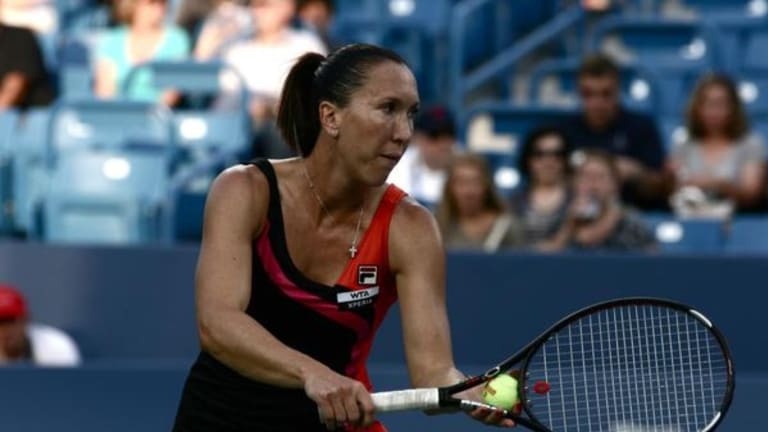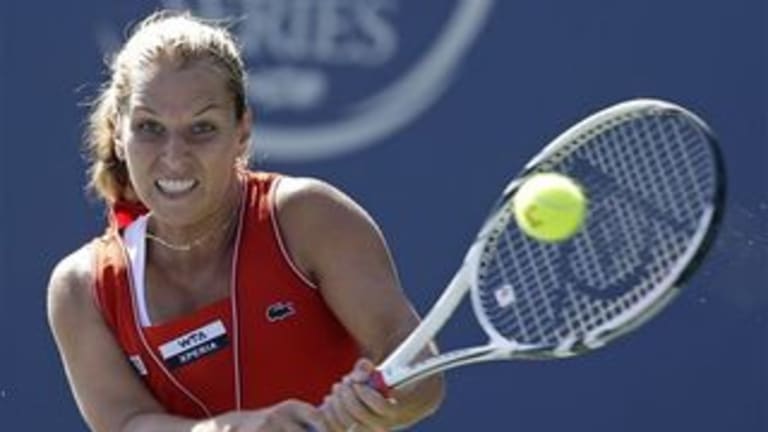MASON, OHIO — Monday kicked off the women’s first round at the Western & Southern Open. (Tuesday brings with it 41 matches, including six second-round matches.) The tournament also held the WTA All Access Hour, where all of the top eight seeds but Petra Kvitova, who was busy preparing for the Montreal final, made themselves available to the press. Serena’s press conference was a standalone affair and a rollicking good time that will (and should) launch a hundred posts. This one isn’t about that but about two interesting matchups, with quotes from a winner and from Jelena Jankovic, who still wants to be a winner but, increasingly, can’t figure out how. (The picture above is courtesy of the tournament.)
Jelena Jankovic: “It’s a lack of confidence”
Maybe her first-round match was meant to end this way for Jelena Jankovic, what with all the 13s in the stats. Thirteen points into the third set tiebreaker, the 13th seed double faulted. A few points later she did what she’s done 13 previous times this year. She lost in the first round. Her opponent today was Peng Shuai, a two-handed player who played both offense and defense well.
Still this was Jankovic’s match to lose and — after nearly three hours, by a score of 5-7, 7-5, 7-6 (8) — she did.
In the tiebreaker Jankovic lost it at 6-3 (her first match point) with a forced error. She lost it at 6-4 and 6-5 (her second and third match points) thanks to Peng winners, the first a fierce service return that touched the baseline and the second an overhead. Jankovic especially lost it at 7-6 (her fourth match point) with the aforementioned double fault. (The worst thing you can do in a tiebreaker, my favorite tennis partner told me, is double fault; it’s incontrovertible truth.) She lost it at 8-7 (her fifth match point) with a forced error into the net. Jankovic lost it, irrevocably, at 8-9. It was Peng’s first match point, and she hit a backhand winner that Jankovic watched go by. Earlier in the match Jankovic played defense like it was 2008; on this point, she didn’t even try.
At her post-match press conference Jankovic pinpointed the problem. Make that problems.
She walked into the main interview room, maybe 15 minutes after the match and 45 minutes before midnight, still in her tennis kit, wondering if anyone was in the room. Four of us were, and a local newspaper reporter kicked things off with this: “Talk about your frustration today having five chances to close out the match in the tiebreak.” Jankovic shook her head slightly, adjusted herself on her chair and sighed a long sigh. Maybe she wanted to make sense of the madness, to get it all out.
“It’s a lack of confidence and, you know, when I come to the finish line I’m just not able to finish in a good way and really execute my shots and do what I’m supposed to do,” said Jankovic. “So she took the advantage and won.”
It’s true. Jankovic lost despite winning the first set. Even after losing the second she led 2-0 and later 4-2 in the third set. Then there’s the whole five-match-points thing.
Another problem, as Jankovic also identified, were the double faults. Twelve of them. (Jankovic guessed “nine or ten” but who wants to correct a player who just lost a three-hour match after blowing five match points?)
She didn’t accelerate, said Jankovic, who also didn’t mince words. “It’s all in my control. Nobody is rushing me; it’s all up to me to do it.”
It wasn’t all bad news. Jankovic mentioned the aces (she hit nine of them, she guessed right on that count) and said her movement was better than it’s been the last few months. Fact is, she played a great first set — she hit winners and chased down balls and, along with Peng, gave fans something to text home about.
The problem for Jankovic, as for any player, is that a great first set isn’t enough.
Dominika Cibulkova: “So that’s my advantage”

